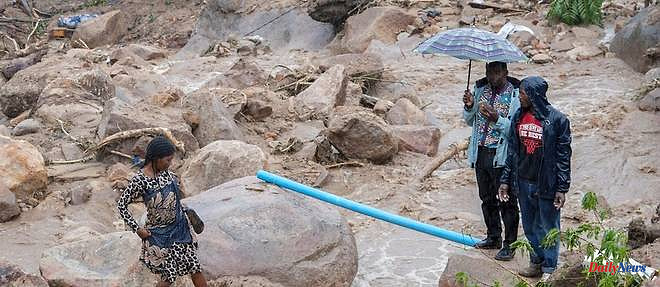Soaked clothes hang from the windows of a school in the Blantyre region, Malawi's economic capital. Here, hundreds of homeless people after Cyclone Freddy, which killed nearly 200 people in the impoverished southern African country, have come to seek refuge.
The exceptionally long-lasting tropical cyclone, which struck southern Africa twice in less than three weeks, is wreaking havoc in the south of the country. The torrential rains led to deadly floods and landslides. At least 190 people have died, according to the government.
Mayeso Chinthenga, 14, was out with other boys collecting firewood when they "saw rocks rolling down the mountain". They ran as fast as they could.
He and his family survived the landslide. But "our house is destroyed. We have lost everything", he says sadly. Before adding: "Some of our neighbors died on the spot".
He and the rest of his family of five have been living in the Kapeni school since Monday. There are many women and children with them.
"A lot of people came here looking for shelter, saying they had fled the mudslide," said Florence Chiwale, a teacher at the school. "We decided to open the classrooms to them."
Nearly 20,000 Malawians lost their homes as the cyclone returned to the region.
Freddy had hit southern Africa for the first time at the end of February. Following an unprecedented curved trajectory, it returned a few weeks later. It hit Mozambique for the second time over the weekend (20 dead), before heading towards southern neighboring Malawi on Monday, with gusts at 200 km / h, according to meteorologists.
In classrooms, tables have been pushed against the walls to make room. Freddy's survivors sleep on the ground, on concrete.
No mattresses, no ceiling lamps, "we use solar lamps", specifies Rose Longer, a humanitarian worker on the spot.
Food arrives in a trickle and mainly thanks to donations, she continues: rice, beans and something to drink.
In the school kitchen, three women prepare the traditional porridge made from maize flour. They volunteered to prepare the meals.
A bag of freeze-dried rice with beans and meat in his hand, Mayeso Chinthenga is happy to receive food for the first time since he arrived there.
The state of disaster has been triggered in order to be able to release exceptional means. The government is also counting on international aid.
Freddy should go back to sea during the week and weaken, according to forecasts. Several storms or cyclones pass through the southwest Indian Ocean every year during the hurricane season, which runs from November to April.
The phenomenon, formed off Australia and which reached the storm stage in early February, has been raging in the Indian Ocean for 36 days. Tropical Cyclone John lasted 31 days in 1994.
14/03/2023 21:07:52 - Kapeni (Malawi) (AFP) - © 2023 AFP












